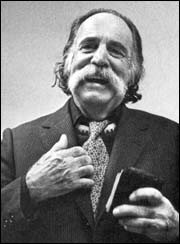
Ever read an old novel, and realize how different its style is?
Maybe it’s a romantic novel from the 1800s, or a rambling post-modern narrative from Ernest Hemingway. But around the 1940s, you get what I think of as “The Great American Novelists”. That is, people who were consciously setting out to write glorious, high-stakes pageants about life itself.
I was a big fan of Thomas Wolfe, and finally got around to watching a breathtaking production of a Thornton Wilder play. But this all brings me back to the man I now think of as “the lost novelist”.
Because you can’t buy his books for the Kindle.
William Saroyan grew up in Central California, and later depicted all the joys and dramas of small-town life in “The Human Comedy,” a devastating, bittersweet look at one family during World War II. He was always creating rich settings for touching stories about simple people facing an extraordinary crisis. The jacket of one book calls him “one of the permanently significant names in modern American fiction.”
Today I went to a public library about three hours from where Saroyan grew up, and I pulled one of his books off the shelf. It was published in 1951, and I’d never heard of it. (It’s called Rock Wagram – the story of a Fresno bartender who later in life struggles with the unexpected pitfalls of success.) As I held the book in my hand, I thought: this is something you can’t do on a Kindle.
You can’t read this.
Every man is a good man in a bad world. No man changes the world. Every man himself changes from good to bad or from bad to good, back and forth, all his life, and then dies. But no matter how or why or when a man changes, he remains a good man in a bad world, as he himself knows. All his life a man fights death, and then at last loses the fight, always having known he would. Loneliness is every man’s portion, and failure. The man who seeks to escape from loneliness is a lunatic. The man who does not laugh at these things is a bore. But the lunatic is a good man, and so is the fool, and so is the bore, as each of them knows. Every man is innocent, and in the end a lonely lunatic, a lonely fool, or a lonely bore.
But there is meaning to a man. There is meaning to the life every man lives.
Saroyan goes on to say it’s “a secret meaning.”
And then the novel begins…
